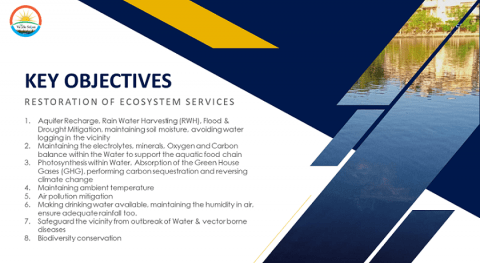Today, we are living in urban concrete jungles. 2008 was the first year in the modern history of the human race on the planet when the urban population exceeded the rural population.
If we look at all the historic cities, all dwelled on the banks of a waterbody, be it a river or a sea or even huge lakes or wetlands. The key reason behind was the natural abundance and the connectivity. Since water had a natural flow, waterways were the cheap mode of transportation wherein the road itself were propelling the vehicles (the boats or the ships). Moreover, wetlands also ensured the natural biodiversity to dwell, thus there were good availability for drinking Water and irrigation too. All human economic activities need a lot of water and therefore they could develop economic activities only around the centres which had abundant sources of water.
But the population rise started consuming more and more resources and eventually the abundance started turning into scarcity. Moreover, human beings changed their lifestyles from an eco-friendly sustainable life to unhealthy, unsustainable luxurious life against the natural harmony. This caused further depletion of the resources. And finally in the year 2008, United Nations came up with a new need for Mega cities or what we call as the Smart Cities of today. Since the resources were limited and the population was exploding, we need to smartly priorities the resources and use them in more efficient ways. Resources like electricity, Water, traffic management, security & surveillance, healthcare, transport system and so on – all urban necessities had to be planned intelligently.
Four years later in the year 2012, United Nations Summit in Rio de Janeiro came up with yet another concept for “Sustainable Development Goals”, or what we know as UNSDG of today. All these concepts have been recent developments in the modern human history – Smart Urban Planning & Sustainable Development.
Sociologically speaking, we divide the world amongst Rural & Urban factions and believe that these two worlds are way different from each other, and so are their problems and challenges. Thus, we usually take two different approaches to address their issues too.
But we forget that the basic amenities for all human beings, animals and plants, remain the same. Our approach that ecology, environment and economics can’t go hand-in-hand has been proven to be wrong, whenever we talk of sustainability, recession free economics and constructive development ideas.
In year 2003, Maddison, Angus in the book “Development Centre Studies: The World Economy Historical Statistics”, published by OECD Publishing vide ISBN #9264104143, mentioned on pages 257-261, that from the 1st century AD to the start of British colonisation in India in the 17th century, India's GDP was between about 25% - 35% of the world's total GDP, that too without invading any country and with all the citizens living in absolute harmony with nature & environment. This is the biggest example of “recession free” economics, in accordance with ecology.






